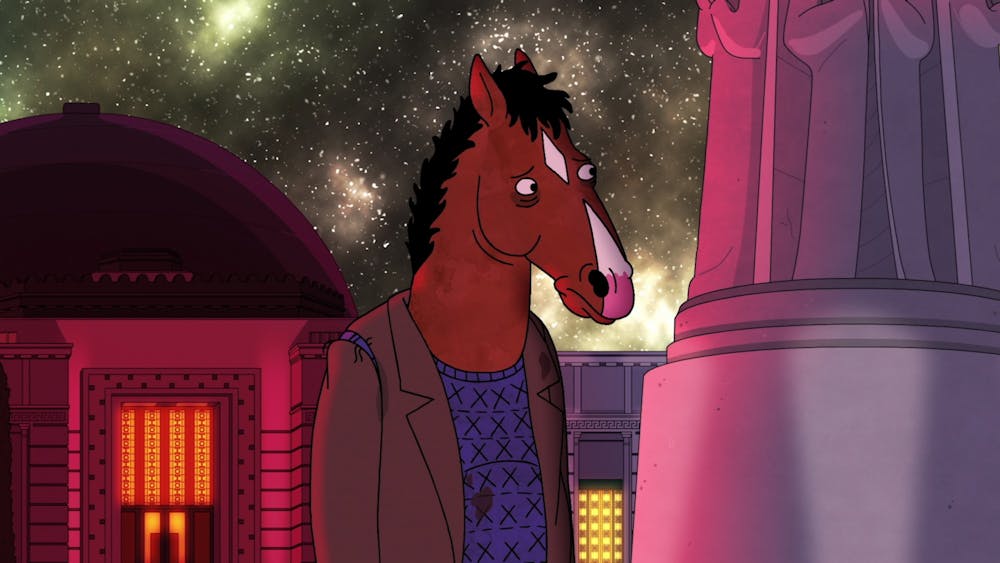Warning: this article contains minor spoilers for the final season of BoJack Horseman.
BoJack Horseman is over, and everything is worse now. Raphael Bob–Waksberg’s animated tragicomedy finally came to its conclusion on Jan. 31, 2020, five and a half years after it first began. The show was significant for Netflix as part of its first crop of original programming, but its impact goes beyond streaming significance. Over 77 episodes, BoJack Horseman developed from one of may bleak, semi–unfunny animated shows to one of the greatest on television, animated or otherwise.
Admittedly, it took BoJack some time to find its footing. The first few episodes reek of the stereotypes of “adult animation,” wherein cartoon characters like Eric Cartman and Peter Griffin drink, smoke, swear, have sex, and otherwise trip over themselves to remind the audience that cartoons aren’t just for kids. "Look," say the showrunners, "the funny horse has a drinking problem! The nerd girl is married to a stupid dog!" Initially, these characters were caricatures, made for gawking and laughing, and none more so than its misanthropic antihero, the titular BoJack (Will Arnett).
Things start to fall into place in the fifth episode, “Live Fast, Diane Nguyen,” in which Diane (Alison Brie), BoJack’s ghostwriter, has to travel back to Boston after her father’s death and face the family that hurt her. Not only is BoJack’s hallucinatory reaction to a kaleidoscope infinitely funnier than the R–rated slapstick that preceded it, but the concluding conversation between BoJack and Diane, a genuinely heartfelt moment between two people from broken homes, reveals the first glimpse of a show that can be more, something both with heart and with the capacity to break them.

By the end of season one, BoJack had found its stride not as an example of risqué adult animation, but as a subversion of it. The characters grow and change and face the consequences for their actions. Workaholic Princess Carolyn (Amy Sedaris) struggles with miscarriage and adoption, slacker Todd (Aaron Paul) navigates coming out and dating as asexual, Diane grows from “the girl” to a character in her own right. Even the unflappable Mr. Peanutbutter (Paul F. Tompkins) realizes that, sometimes, you don’t always get what you want.
A darkness pervades the second half of season six. BoJack has taken a teaching position at Wesleyan, where his half–sister Hollyhock (Aparna Nancherla) attends as a student. Yet two intrepid reporters are hell–bent on drudging up his darkest secrets, and every success is undercut by the looming fall from grace. BoJack’s drinking problem, which was played for laughs earlier, becomes a sword of Damocles, his sobriety the horsehair (no pun intended).

BoJack consistently saves its best and darkest moments for the penultimate episode. Season 1’s “Downer Ending” delivered pathos as BoJack begged Diane to tell him that he was a good person. In “Escape from LA” the next season, his self–destructive choices were no longer tolerated by Hollywoo coddling. Season 3’s “That’s Too Much, Man!” obliterated what should have been a beautiful moment with a heart–wrenching death, while “Time’s Arrow” provided a devastating look into BoJack’s mother’s dementia–addled mind. Not even a song and dance number could provide levity to the bleakness of “The Showstopper.”
The penultimate episode of season 6, and thus of the show, “The View from Halfway Down,” is a flawless half–hour of television. BoJack finds himself at a dinner party, surrounded by the dead that still haunt him: Sarah Lynn (Kristen Schaal), his mother Beatrice (Wendie Malick), his old boss and friend Herb Kazzaz (Stanley Tucci), his uncle Crackerjack (Lin–Manuel Miranda), and an amalgamation of his biological father Butterscotch and his hero Secretariat (also voiced by Will Arnett). It’s obvious, from his dinner company to the black liquid he vomits to the door to nowhere, that something is not quite right, but BoJack — and the viewer — are powerless to stop what seems to be inevitable.
The series finale, “Nice While It Lasted,” is quiet. Literally. Unlike season 3’s “Fish Out of Water,” which was almost completely silent, there is dialogue, but the only speaking characters are the main five with whom we started the show. BoJack is given a final conversation with Mr. Peanutbutter, Todd, Princess Carolyn, and finally Diane, trying to make his peace with all of them in turn. After all, he said himself in “Fish Out of Water,” “In this terrifying world, all we have are the connections that we make.”

BoJack Horseman does not end cleanly. Side plots are left unraveled, and the future seems uncertain, but the show has been warning the audience of such from the beginning. In “Live Fast, Diane Nguyen,” BoJack tells Diane that “Closure is a made–up thing by Steven Spielberg to sell movie tickets,” and in “Free Churro,” he soliloquizes that, “If everyone’s happy, the show would be over, and above all else, the show… has to keep going.” BoJack Horseman may no longer be on television, but the show, the lives of its characters, will continue off–screen.
BoJack was unflinching in the way that it looked at depression, addiction, emotional abuse, and the way that trauma impacts its victims, but it never succumbed to its own bleakness. Every character’s success is perilous, but every devastating moment comes with the promise of hope. “Life’s a bitch and then you die, right?” BoJack tries to tell Diane, reverting to the cynicism of when they first met, but she rebuffs him. “Sometimes. Sometimes life’s a bitch and then you keep living.”







